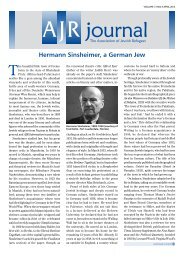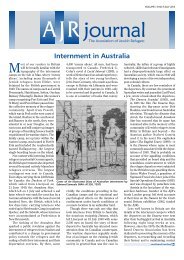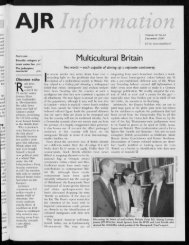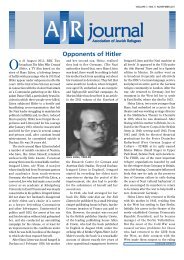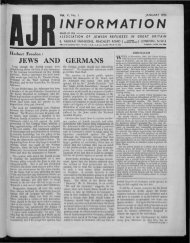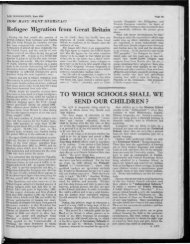INFORMATION - The Association of Jewish Refugees
INFORMATION - The Association of Jewish Refugees
INFORMATION - The Association of Jewish Refugees
Create successful ePaper yourself
Turn your PDF publications into a flip-book with our unique Google optimized e-Paper software.
Page 8 AJR <strong>INFORMATION</strong> May, 1970<br />
Alex Natan<br />
PRUSSIA'S ROLE IN HISTORY<br />
On February 25, 1947, the Allied Control<br />
Council promulgated Law No. 46 which terminated<br />
the State <strong>of</strong> Prussia: " <strong>The</strong> Prussian<br />
State which from early days has been a<br />
bearer <strong>of</strong> militarism and reaction in Germany<br />
has de facto ceased to exist. . . . <strong>The</strong> Prussian<br />
State, together with its central government<br />
and all its agencies, is abolished ". Thus ended,<br />
after many centuries, the political existence<br />
<strong>of</strong> a State without an ethnic basis which has<br />
gone down in history both as the hero and<br />
the villain <strong>of</strong> the German people.<br />
<strong>The</strong> book by E. J. Feuchtwanger,* who is<br />
a lecturer in the University <strong>of</strong> Southampton,<br />
is the first modern account in English <strong>of</strong><br />
Prussia's rise and fall. It is not an orthodox<br />
sitory <strong>of</strong> the emergence and development <strong>of</strong><br />
a political entity but a well-balanced discourse<br />
about Prussia as a problem in German<br />
history. <strong>The</strong> author gives enough space to the<br />
variegated collection <strong>of</strong> bits and pieces which<br />
the Hohenzollem rulers welded into a State<br />
which was partly admired for its ethos enabling<br />
this process, partly vilified as bearer <strong>of</strong><br />
militarism and retarding reactionary forces<br />
which were blamed for a series <strong>of</strong><br />
wars. Keeping the political development always<br />
in mind Mr. Feuchtwanger has also<br />
written a most stimulating account <strong>of</strong> the<br />
social and cultural trends which shaped Prussia<br />
before she incorporated the rest <strong>of</strong> Germany<br />
and before she lost her distinctive<br />
character by being merged into the industrial<br />
society <strong>of</strong> Germany and by being taken for<br />
the arch villain <strong>of</strong> German expansionist<br />
foreign policy.<br />
To understand the magnitude <strong>of</strong> " Prussianism,"<br />
its causes and consequences, the<br />
reader's attention may be drawn anew to Pro-<br />
* E. J. Feuchtwanger : Prussia : Myth and Reality.<br />
Oswald Wolff, London. 282 pp. SOs.<br />
SCHWARZSCHILD<br />
OCHS<br />
LIMITED<br />
Walmar House,<br />
296 Regent Street,<br />
London, W.l<br />
Telephone: 01-580 4069<br />
fessor Carstens's " <strong>The</strong> Origins <strong>of</strong> Prussia",<br />
which appeared 16 years ago and serves as an<br />
excellent curtain-raiser for Mr. Feuchtwanger's<br />
analysis. Both books convey enough<br />
material and interpretations to allow a<br />
balanced judgement on whether the world's<br />
opinion was right to assume that the bad<br />
Prussians were leading the good Germans<br />
astray or whether this assumption was totally<br />
or partly wrong. Emil Ludwig had already<br />
emphasised in his book " <strong>The</strong> Germans " that<br />
most " bad" Prussians hailed from other<br />
parts <strong>of</strong> Germany, from the apologetic historians,<br />
Sybel and Treitschke, onward to<br />
Prussia's grave-diggers. Hitler's hierarchy.<br />
<strong>The</strong> " good " Prussians were to be found predominantly<br />
among artists, philosophers and<br />
advocates <strong>of</strong> peaceful co-existence. <strong>The</strong> problem<br />
is far more complex. Mr. Feuchtwanger<br />
sides convincingly with Friedrich Meinecke<br />
when he states: " <strong>The</strong>re was never any<br />
straight antithesis between the Germany <strong>of</strong><br />
the poets and thinkers and the Prussia <strong>of</strong><br />
soldiers and barrack-rooms." <strong>The</strong> destiny <strong>of</strong><br />
Prussia was a curious mixture <strong>of</strong> reality and<br />
falsifying myth.<br />
Frugality and discipline<br />
<strong>The</strong>re was a military, very frugal caste, the<br />
backbone <strong>of</strong> an army; there was an efficient,<br />
self-sufficing bureaucracy, the disciplined,<br />
civil arm <strong>of</strong> the State, there was an excellent<br />
education, all geared for the creation <strong>of</strong><br />
mutual confidence between the State and its<br />
subjects. <strong>The</strong> successful, if only euphoric<br />
moulding <strong>of</strong> these social ingredients helped<br />
much to create the impression that united<br />
Germany was the result <strong>of</strong> the realistic concepts<br />
and policies <strong>of</strong> Prussia. When Prussia<br />
had really finished its task, the Prussian idea<br />
became the dangerous property <strong>of</strong> myth- and<br />
mischief-makers. " <strong>The</strong> Prussian ethos carried<br />
many connotations which were sometimes the<br />
reverse <strong>of</strong> those conveyed by the Prussian<br />
idea in more recent times." This myth <strong>of</strong> the<br />
" chosen" Prussians as the epitome <strong>of</strong> austere<br />
self-sufficiency and political mission<br />
reached its culmination on the notorious Day<br />
<strong>of</strong> Potsdam (March 21, 1933) when Hitler, as<br />
the evil propagandist <strong>of</strong> " Prussianism ", produced<br />
a spectacle in the Gamisonkirche<br />
which, in spite <strong>of</strong> all its symbolism and<br />
theatrical pathos, was the very negation <strong>of</strong> so<br />
much that was positive and constructive in<br />
the Prussian idea.<br />
In more than one respect Pmssia ceased to<br />
exist after the unification because she increasingly<br />
lost her historical and moral identity<br />
when Germany embarked on a course which<br />
led to economic supremacy and political<br />
suicide. This had not been the intention <strong>of</strong><br />
Bdsmarck, the greatest <strong>of</strong> all Pmssians, about<br />
whom Mr, Feuchtwanger pronounces a sensible<br />
and most readable verdict. Germany's<br />
emerging society showed occasionally strands<br />
<strong>of</strong> old Pmssian virtues but was essentially a<br />
creation <strong>of</strong> a " Zeitgeist" to whdch Prassia<br />
had little to contribute. Prussia continued to<br />
exist until she committed suicide when her<br />
government allowed itself to be chased from<br />
<strong>of</strong>fice on July 20, 1932. It was historical irony<br />
that the Socialists, once branded as the archenemy<br />
<strong>of</strong> the Prussian idea, surrendered a<br />
fortress which had been the last buttress <strong>of</strong><br />
many Prussian virtues.<br />
It is a distinct advantage <strong>of</strong> this book to<br />
devote space to the position <strong>of</strong> the Jews in<br />
Pmssian history. This is important because<br />
they are so <strong>of</strong>ten blamed for having contributed<br />
towards the downfall <strong>of</strong> Pmssia. <strong>The</strong><br />
author deals with the emancipation in detail<br />
and emphasises "the instinctive antisemitism<br />
and administrative discrimination against<br />
Jews common in Prussia and the demagogic,<br />
racialist antisemitism which began to arise<br />
in Germany in the 1880s ". Treitschke is described<br />
not only as one <strong>of</strong> the myth-makers<br />
but also as the man " who made antisemitism<br />
respectable in Germany ". One is indebted to<br />
the author for stressing how much Jews like<br />
Fr. Stahl, Lassalle, Lasker, Bamberger, Bleiehroder<br />
have contributed to Bismarck's vital,<br />
political and formative years. Unfortunately<br />
the role played by the so-called "Kaiserjuden",<br />
such as Ballin, Rathenau, Warburg,<br />
James Simon, et alia, is neglected although<br />
they possessed direct access to the King <strong>of</strong><br />
Pmssia.<br />
After having read Mr. Feuchtwanger's<br />
stimulating description <strong>of</strong> "Aufklamng" and<br />
" Romantik " and after having regretted the<br />
briefness <strong>of</strong> the Epilogue one likes to hope<br />
that Mr. Feuchtwanger may take up the same<br />
themes once more for a broader discussion.<br />
This book should find a German translation<br />
because it is a healthy antidote to the romantic<br />
and sentimental attitude in present-day<br />
Germany which endeavours to whitewash the<br />
Prassian heritage. Its protagonist is Pr<strong>of</strong>essor<br />
Hans Joachim Schops who was publicly<br />
praised as " Jew, Conservative and Prussian "<br />
when he recently celebrated his 60th birthday.<br />
Berlin's " Tagesspiegel " (Febraary 13,<br />
1970) published at the time a very outspoken<br />
attack against Schops producing scathing,<br />
documentary evidence that, during the first<br />
years <strong>of</strong> the Nazi regime, this would-be<br />
saviour <strong>of</strong> the Prassian idea repeatedly expressed<br />
his sympathy with various aspects <strong>of</strong><br />
the Nazi ideology. Feuchtw-anger's book in a<br />
German translation could redress the balance.<br />
WitL<br />
%p\<br />
0iii:^5^Ss=;^<br />
4 Gladstone Road<br />
(<strong>of</strong>f Queen's Road)<br />
Southali, Middlesex



